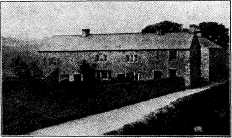| JOURNAL 1993 |
| North Craven Heritage Trust |
The Act of Uniformity in Elizabeth's reign gave birth to Dissent; and the Act that became law in 1662 created 'Nonconformity'. Previously the only training grounds for ministers had been the Universities of Oxford and Cambridge. However, Dissenters had been excluded from Oxford since 1581, and from Cambridge since 1616. The only trained ministers available for Nonconformist Meeting Homes were therefore those who had been ejected; and these were gradually being reduced in number as a result of death or their conforming. It became evident that in a short time none would be left. It was to provide a trained ministry for Nonconformists that Richard Frankland opened his house and started his Academy.
Richard Frankland entered Giggleswick School at the age of 10; 8 years later he was admitted to Christ's College, Cambridge and took his BA in 1652 and his MA in 1655. He received Presbyterian Ordination on 14th September 1653 at Lanchester, Co. Durham, and held a number of churches in the North of England until the time of the Restoration when his position became difficult. His ordination at the hands of Presbyters and not of a Bishop had been legal under the Commonwealth but was no longer recognised as valid. So, in 1662, he was ejected from his living, and returned to Rathmell with his wife and two small children. The Academy opened in 1670; in the first year or so he had 15 pupils but membership soon grew and in the space of a few years he was said to have had up to 300 under his tuition, some of them for Law, some for Physick, but most for the Ministry.
At this time the court in Settle fined Sam Watson £150 for holding a Quaker meeting at Eldroth Hall, so no doubt they had their eye on Rathmell. Persecution soon harassed Frankland's endeavours and in 1674 he was compelled to move the Academy to Natland; here it came under the 5 Mile Act so eventually it was back over the County border to Calton Hall, Malham-dale, but only for a year before moving on again to Dawson Fold, Lancashire. Then again in 1685 it was across a County line, this time at Hartburrow in Westmorland. Yet again the 'powers that be' moved the Academy, this time back to Yorkshire, to Langcliffe. At last in 1689 King James IIs Act of Indulgence gave freedom to Nonconformists, and so Frankland bought a 50/- license and returned to Rathmell.
The Rev. J. Cockin visited Rathmell April 21st, 1821 and gave an account of what he found out at "College Fold" 172 years ago. "It was an extensive establishment, bounded by a high wall, which enclosed an acre of ground. Over the gate of the yard was a large bell which rang at stated times, to call the students up and summon them to prayers, and meals. Some buildings have been taken down, and those which are still standing are converted into cottages. There was a long row of windows to the different studies, most of which are now walled up. The kitchen was described to me as having been very large, and my guide told me that when she was a girl she had often hidden herself in the oven in a game of hide and seek. The garden and orchard were extensive, but are now converted into pasture land."
A recent survey in the light of the Rev. Cockin's account suggests a quadrangle wall of some 9 ft in height running by what was the old road to Giggleswick via Lumb and Close House (which Frankland bought in his later years) on the north side. To the west, the boundary wall lay between the quadrangle, the orchard and the vegetable garden. The latter is now pasture land bounded by what is probably the oldest field wall in the parish, built in a sweep to enclose the maximum land with the shortest wall, no doubt about or before 1600. To the east side the cottages by the present road are of great interest. Careful examination suggests these must have been part of the old Academy. This was a three storey building originally with three ground floor lecture rooms and with a connecting cloister on the west side running the length of the building. These cottages probably contain more of the original Academy than the part which has retained the name "College" but little of the college structure.
Apart from the memorial to Richard Frankland, the man, on the wall in Giggleswick Church, there is no other mention of Rathmell and its academy. Although it was one of the first and by far the largest in the country, producing many of the ablest ministers of early Nonconformity, this wealth of heritage in the Ancient Parish remains without any memorial. To redress this the "Richard Frankland Memorial Committee" has been set up, and funds are being raised to place a plaque in Rathmell to let all passers-by know that at this place a little bit of English history was made.
Jim Nelson
Member of "The Congregational History Circle".

J1993p10_20_files/tmpBB9-2.jpg
Richard Frankland MA

J1993p10_20_files/tmpBB9-3.jpg
College Fold, Rathmell

J1993p10_20_files/tmpBB9-4.jpg
College Fold, Rathmell, taken from "On Foot Round
Settle" by G.H. Brown, an illustration added by
T. Brayshaw